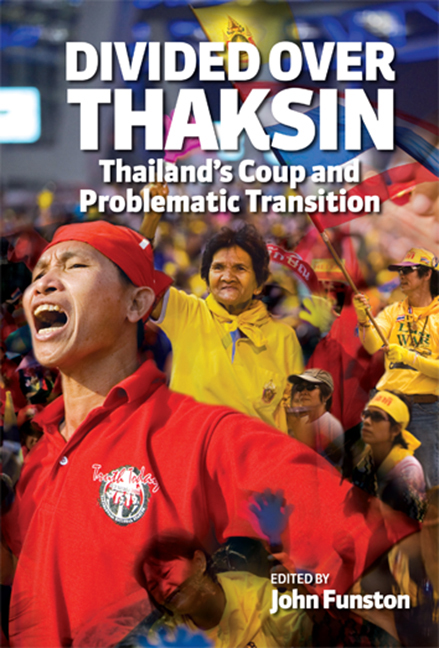Book contents
- Frontmatter
- Contents
- List of Tables and Figures
- List of Contributors
- Preface
- Introduction
- 1 Political Contests in the Advent of Bangkok's 19 September Putsch
- 2 The Tragedy of the 1997 Constitution
- 3 The NESAC, Civil Society, Good Governance and the Coup
- 4 Military Coup and Democracy in Thailand
- 5 Deconstructing the 2007 Constitution
- 6 Thailand's 2007 Constitution and Re-Emerging Democracy: Will Political Polarization Continue?
- 7 Untying the Gordian Knot: The Difficulties in Solving Southern Violence
- 8 Another Country: Reflections on the Politics of Culture and the Muslim South
- 9 Governance in the South: Is Decentralization an Option?
- 10 Tradition and Reform in Islamic Education in Southern Thailand
- 11 The Economy under the Thaksin Government: Stalled Recovery
- 12 The Thai Economy after the Coup
- 13 The Impact of Political Uncertainty on Business
- Index
10 - Tradition and Reform in Islamic Education in Southern Thailand
Published online by Cambridge University Press: 21 October 2015
- Frontmatter
- Contents
- List of Tables and Figures
- List of Contributors
- Preface
- Introduction
- 1 Political Contests in the Advent of Bangkok's 19 September Putsch
- 2 The Tragedy of the 1997 Constitution
- 3 The NESAC, Civil Society, Good Governance and the Coup
- 4 Military Coup and Democracy in Thailand
- 5 Deconstructing the 2007 Constitution
- 6 Thailand's 2007 Constitution and Re-Emerging Democracy: Will Political Polarization Continue?
- 7 Untying the Gordian Knot: The Difficulties in Solving Southern Violence
- 8 Another Country: Reflections on the Politics of Culture and the Muslim South
- 9 Governance in the South: Is Decentralization an Option?
- 10 Tradition and Reform in Islamic Education in Southern Thailand
- 11 The Economy under the Thaksin Government: Stalled Recovery
- 12 The Thai Economy after the Coup
- 13 The Impact of Political Uncertainty on Business
- Index
Summary
INTRODUCTION
There is much literature on Islamic education in the south. Most of it identifies a major disconnect between how Islamic schools are perceived by the state and by the Malay Muslim community. From the state' perspective, a number of assumptions inform their understanding of Islamic schools in the south: schools encourage separatism by perpetuating Malay culture in an insular and exclusivist manner; the system of education privileging religious over academic and vocational training does not prepare students for modern Thai society, thereby widening the gulf between Malay (communal) and Thai (national) identities; and, schools teach a radical brand of Islam that legitimizes violence against the state.
On the other hand, in the eyes of the local Malay-Muslim community, Islamic education is seen to be central to Malay-Muslim identity based on a historical narrative that speaks of the greatness and independence of the Patani kingdom. To them, the centrality of Islamic education is expressed in the institution of the pondok, the traditional Islamic school that remains a key institution in Malay communal life, and the prominence of the Malay language as the language of Islam.
Notwithstanding the significant gulf in perceptions enumerated above, the tendency in both perspectives is to view the Muslim community and Islamic education as a monolithic entity. In doing so, the literature that spawns from such perspectives paper over some major shifts and trends in Islamic education in the southern provinces that have important implications for how we understand the conflict in the south. This chapter aims to flesh out some of these shifts and trends, and suggest how they might inform our thinking of developments in the south in relation to questions of Malay-Muslim history and identity.
ISLAM, HISTORY, AND TRADITIONALISM
Historically, the Kingdom of Patani consisted of the area that today roughly coheres geographically to the provinces of Pattani, Yala, and Narathiwat in southern Thailand, and was known between the sixteenth and eighteenth centuries as a Dar’ al Islam (abode of Islam). At the same time, Patani was also a flourishing centre of commerce and trade, where traders from Southeast Asia met and transacted with counterparts from elsewhere on the Asian continent as well as Europe.
- Type
- Chapter
- Information
- Divided Over ThaksinThailand's Coup and Problematic Transition, pp. 135 - 149Publisher: ISEAS–Yusof Ishak InstitutePrint publication year: 2009

